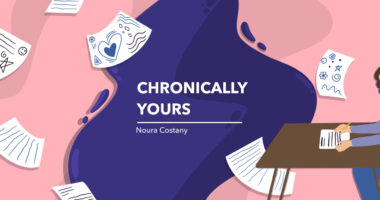My Experience with Health Anxiety

Impending doom. Shortness of breath. Pale skin and shakes. Body shivers. Teeth chattering.
Those are just a few of the many symptoms of a panic attack. Anxiety and panic attacks are shockingly common for many people who have Cushing’s disease, even before they realize what they have. Raised levels of cortisol running through the body cause much of it. For those with hereditary anxiety and depression, the raised cortisol levels intensify the effects of these mental health problems.
Something I’ve found common between myself and a lot of the Cushing’s patients I’ve spoken with is that their doctor or endocrinologist says that their anxiety and depression will most likely diminish after surgery. After surgery has been completed and months or even a year or two (or more) have passed, many of us find that our anxiety has actually heightened, and we feel worse than before regarding our mental health. This, folks, is what is known as “health anxiety” or “illness anxiety disorder” as the Mayo Clinic puts it.
These past few weeks, I’ve been incredibly sick with headaches, throwing up, fatigue, body weakness, and more. I even landed in the hospital once and almost went again last week because I had the worst panic attack ever. (The last time I had a panic close to that degree, I was 15 or 16.) It all started with a tickle in my throat that was causing me to cough. I also had shortness of breath and had been feeling tightness in my chest all day. As I was panicking, I texted my two amazing friends in our group chat (they also have/had Cushing’s) and one of them mentioned that they suffer through the exact same thing. Her psychologist deems it health anxiety. I just thought I was crazy, but after she explained everything, I realized it was exactly what I was going through. Of course, after my attack, I immediately began to research health anxiety.
I get so many messages from Cushing’s patients or those recovering from their Cushing’s saying that they are dealing with panic attacks and they feel like there is something wrong with them for being so worried all the time. It isn’t their fault. Honestly, it’s not anyone’s fault. Cushing’s affects our bodies so much, and the disease makes it incredibly difficult to feel normal after surgery. Since reoccurrence is a possibility with all of us, we can’t help but panic because going through it once was hell enough. We don’t want it to come back; we don’t want to go through it again; we don’t want to see those effects ever again.
Some days it’s incredibly difficult to go on, but we need to focus on living our lives in the present, day by day. I know I say that a lot, but it really is the truth. We can’t focus on what could happen in the future when there is a huge chance it won’t happen again.
Below, I’ve listed a few things I do to help take control of my anxiety. It’s not foolproof, as it takes a lot of work. Don’t get discouraged! It’s hard work but incredibly rewarding.
- Restorative yoga. This is an incredibly gentle, easy yoga that doesn’t expect much from someone. Essentially, no pretzel flexibility is needed! Sarah Beth has been my favorite YouTuber for all things yoga lately. Check her out here.
- Keeping busy. I study nutrition, I’m launching a lash and sunless tanning business, and I read. Keeping the mind occupied allows us to stop obsessing over every little feeling going on in the body.
- Counseling and medications. If you’re able to access these, don’t brush them off. Try them out but don’t give up. It won’t improve in three days or a week. It takes months of commitment to yourself and trying different medications. Sometimes, our brain needs the help to create the correct chemicals we need.
Is there anything you do to help yourself during extreme days of anxiety and panic? Let me know!
XOXO, Catarina.
***
Note: Cushing’s Disease News is strictly a news and information website about the disease. It does not provide medical advice, diagnosis, or treatment. This content is not intended to be a substitute for professional medical advice, diagnosis, or treatment. Always seek the advice of your physician or other qualified health provider with any questions you may have regarding a medical condition. Never disregard professional medical advice or delay in seeking it because of something you have read on this website. The opinions expressed in this column are not those of Cushing’s Disease News or its parent company, Bionews Services, and are intended to spark discussion about issues pertaining to Cushing’s disease.






Leave a comment
Fill in the required fields to post. Your email address will not be published.